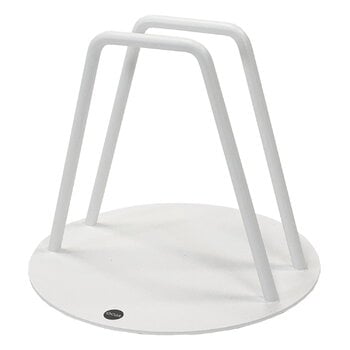The OOJA Displays K001 cart rack is designed as an add-on to the K001 cart. With the help of the rack, the front wheel of the cart can be locked firmly and securely in place, should you want to use the cart as a more permanent element in a shop or, for example, as a distinct side table in your home. The OOJA Displays' K001 cart rack is manufactured in Finland.
K001 cart rack, white
OOJA displays
Description
The OOJA Displays K001 cart rack is designed as an add-on to the K001 cart. With the help of the rack, the front wheel of the cart can be locked firmly and securely in place, should you want to use the cart as a more permanent element in a shop or, for example, as a distinct side table in your home. The OOJA Displays' K001 cart rack is manufactured in Finland.
Product details (6)
- Colour
- White
- Height
- 25 cm
- Diameter
- 28 cm
- Material
- Powder-coated steel, aluminium
- Weight
- 4 kg
- Care instructions
- Clean with a moist cloth. Dry the surface after wiping.
Designer
Finnish Noora Sallasmaa and Janne Norokytö are a designer couple and the founders of OOJA Displays. Working in the Finnish countryside in Sauvo, the duo designs multi-purpose, high-quality and minimalist sales furniture which are mainly made in collaboration with local artisans and small businesses. Both Sallasmaa and Norokytö have solid experience in sales furniture which they have designed for several Finnish brands before founding OOJA Displays.
Reviews (0)
Sustainability
The Product Sustainability Framework, our criteria of sustainable design, helps you find the most sustainable products in our selection. Read below which sustainability criteria this product has met.
Working conditions & labour 8/9
-
Equal opportunities for all employees
-
Commitment to UN Global Compact, fair compensation for all employees
-
Corporate responsibility requirements defined and communicated for suppliers
-
Systematic work for improved inclusion and well-being in the workplace
-
Transparent supply chain
-
Suppliers' compliance to a code of conduct ensured
-
Direct suppliers audited and certified
-
Compliance to the UN Guiding Principles on Business and Human Rights ensured in the supply chain
-
Support for community involvement in the supply chain
Eco-friendly production 7/9
-
Fair and resource-wise water-use in production
-
No incineration or landfilling of returned items
-
No use of endangered species as materials
-
No direct environmental emissions or waste (excl. GHGs) from production
-
Production and material sourcing that respect biodiversity, animal rights, and natural ecosystems
-
Material-efficient and ecological packaging
-
No potentially harmful chemicals used in own production
-
The sustainability of direct suppliers' production is addressed and monitored
-
Positive impact on nature’s well-being through operations that regenerate natural ecosystems
Climate impact 6/8
-
Company's direct greenhouse gas emissions identified and commitment to reduction
-
Product's carbon impact identified and commitment to reduction
-
Guidance on energy- and eco-efficient use of the product
-
Contribution to climate initiatives beyond the brand’s direct operations
-
Low-carbon or compensated transportation
-
100 % renewable energy in own production and operations
-
Carbon footprint of the product calculated and goals set to reduce it
-
Carbon neutral or carbon negative product
Sustainable materials 6/6
-
Sustainable and long-lasting material choices
-
No harmful or hazardous substances
-
Responsible raw material sourcing and production
-
Materials suited for circularity: monomaterials, recyclable finishings, renewable or recycled contents etc.
-
Ecological materials: natural, biodegradable, recyclable or recycled contents
-
Outstanding materials in terms of innovativeness, responsibility, sustainability and circularity: local production or sourcing, 100 % recycled content, C2C-certification etc.
Circular design 5/5
-
High aesthetic quality promoting long-term use of the product
-
Technically durable product design and material choices
-
Design for enduring life-long quality
-
Design and support for product maintenance, repair and upgradability
-
Innovative circular design solutions: circular service system, resale platform, remanufacturing, collection of used products, etc.
Chat to us online
Please enable functional cookies to use this feature. You can change your cookie settings at any time.


